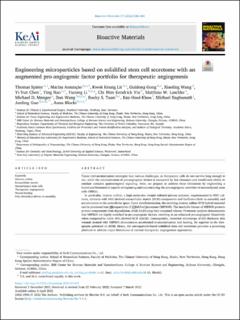Please use this identifier to cite or link to this item:
https://doi.org/10.21256/zhaw-26856Full metadata record
| DC Field | Value | Language |
|---|---|---|
| dc.contributor.author | Später, Thomas | - |
| dc.contributor.author | Assunção, Marisa | - |
| dc.contributor.author | Lit, Kwok Keung | - |
| dc.contributor.author | Gong, Guidong | - |
| dc.contributor.author | Wang, Xiaoling | - |
| dc.contributor.author | Chen, Yi-Yun | - |
| dc.contributor.author | Rao, Ying | - |
| dc.contributor.author | Li, Yucong | - |
| dc.contributor.author | Yiu, Chi Him Kendrick | - |
| dc.contributor.author | Laschke, Matthias W. | - |
| dc.contributor.author | Menger, Michael D. | - |
| dc.contributor.author | Wang, Dan | - |
| dc.contributor.author | Tuan, Rocky S. | - |
| dc.contributor.author | Khoo, Kay-Hooi | - |
| dc.contributor.author | Raghunath, Michael | - |
| dc.contributor.author | Guo, Junling | - |
| dc.contributor.author | Blocki, Anna | - |
| dc.date.accessioned | 2023-02-09T12:02:31Z | - |
| dc.date.available | 2023-02-09T12:02:31Z | - |
| dc.date.issued | 2022 | - |
| dc.identifier.issn | 2097-1192 | de_CH |
| dc.identifier.issn | 2452-199X | de_CH |
| dc.identifier.uri | https://digitalcollection.zhaw.ch/handle/11475/26856 | - |
| dc.description.abstract | Tissue (re)vascularization strategies face various challenges, as therapeutic cells do not survive long enough in situ, while the administration of pro-angiogenic factors is hampered by fast clearance and insufficient ability to emulate complex spatiotemporal signaling. Here, we propose to address these limitations by engineering a functional biomaterial capable of capturing and concentrating the pro-angiogenic activities of mesenchymal stem cells (MSCs). In particular, dextran sulfate, a high molecular weight sulfated glucose polymer, supplemented to MSC cultures, interacts with MSC-derived extracellular matrix (ECM) components and facilitates their co-assembly and accumulation in the pericellular space. Upon decellularization, the resulting dextran sulfate-ECM hybrid material can be processed into MIcroparticles of SOlidified Secretome (MIPSOS). The insoluble format of MIPSOS protects protein components from degradation, while facilitating their sustained release. Proteomic analysis demonstrates that MIPSOS are highly enriched in pro-angiogenic factors, resulting in an enhanced pro-angiogenic bioactivity when compared to naïve MSC-derived ECM (cECM). Consequently, intravital microscopy of full-thickness skin wounds treated with MIPSOS demonstrates accelerated revascularization and healing, far superior to the therapeutic potential of cECM. Hence, the microparticle-based solidified stem cell secretome provides a promising platform to address major limitations of current therapeutic angiogenesis approaches. | de_CH |
| dc.language.iso | en | de_CH |
| dc.publisher | KeAi | de_CH |
| dc.relation.ispartof | Bioactive Materials | de_CH |
| dc.rights | https://creativecommons.org/licenses/by/4.0/ | de_CH |
| dc.subject | Dextran sulfate | de_CH |
| dc.subject | Extracellular matrix | de_CH |
| dc.subject | Mesenchymal stem cell | de_CH |
| dc.subject | Poly-electrolyte-driven co-assembly | de_CH |
| dc.subject | Therapeutic angiogenesis | de_CH |
| dc.subject | Wound healing | de_CH |
| dc.subject.ddc | 610.28: Biomedizin, Biomedizinische Technik | de_CH |
| dc.title | Engineering microparticles based on solidified stem cell secretome with an augmented pro-angiogenic factor portfolio for therapeutic angiogenesis | de_CH |
| dc.type | Beitrag in wissenschaftlicher Zeitschrift | de_CH |
| dcterms.type | Text | de_CH |
| zhaw.departement | Life Sciences und Facility Management | de_CH |
| zhaw.organisationalunit | Institut für Chemie und Biotechnologie (ICBT) | de_CH |
| dc.identifier.doi | 10.1016/j.bioactmat.2022.03.015 | de_CH |
| dc.identifier.doi | 10.21256/zhaw-26856 | - |
| dc.identifier.pmid | 35846945 | de_CH |
| zhaw.funding.eu | No | de_CH |
| zhaw.issue | 17 | de_CH |
| zhaw.originated.zhaw | Yes | de_CH |
| zhaw.pages.end | 541 | de_CH |
| zhaw.pages.start | 526 | de_CH |
| zhaw.publication.status | publishedVersion | de_CH |
| zhaw.publication.review | Peer review (Publikation) | de_CH |
| zhaw.webfeed | Metabolic Tissue Engineering | de_CH |
| zhaw.author.additional | No | de_CH |
| zhaw.display.portrait | Yes | de_CH |
| Appears in collections: | Publikationen Life Sciences und Facility Management | |
Files in This Item:
| File | Description | Size | Format | |
|---|---|---|---|---|
| 2022_Spaeter-etal_Engineering-microparticles-based-on-solidified-stem-cell-secretome_BioactiveMaterials.pdf | 9.81 MB | Adobe PDF |  View/Open |
Show simple item record
Später, T., Assunção, M., Lit, K. K., Gong, G., Wang, X., Chen, Y.-Y., Rao, Y., Li, Y., Yiu, C. H. K., Laschke, M. W., Menger, M. D., Wang, D., Tuan, R. S., Khoo, K.-H., Raghunath, M., Guo, J., & Blocki, A. (2022). Engineering microparticles based on solidified stem cell secretome with an augmented pro-angiogenic factor portfolio for therapeutic angiogenesis. Bioactive Materials, 17, 526–541. https://doi.org/10.1016/j.bioactmat.2022.03.015
Später, T. et al. (2022) ‘Engineering microparticles based on solidified stem cell secretome with an augmented pro-angiogenic factor portfolio for therapeutic angiogenesis’, Bioactive Materials, (17), pp. 526–541. Available at: https://doi.org/10.1016/j.bioactmat.2022.03.015.
T. Später et al., “Engineering microparticles based on solidified stem cell secretome with an augmented pro-angiogenic factor portfolio for therapeutic angiogenesis,” Bioactive Materials, no. 17, pp. 526–541, 2022, doi: 10.1016/j.bioactmat.2022.03.015.
SPÄTER, Thomas, Marisa ASSUNÇÃO, Kwok Keung LIT, Guidong GONG, Xiaoling WANG, Yi-Yun CHEN, Ying RAO, Yucong LI, Chi Him Kendrick YIU, Matthias W. LASCHKE, Michael D. MENGER, Dan WANG, Rocky S. TUAN, Kay-Hooi KHOO, Michael RAGHUNATH, Junling GUO und Anna BLOCKI, 2022. Engineering microparticles based on solidified stem cell secretome with an augmented pro-angiogenic factor portfolio for therapeutic angiogenesis. Bioactive Materials. 2022. Nr. 17, S. 526–541. DOI 10.1016/j.bioactmat.2022.03.015
Später, Thomas, Marisa Assunção, Kwok Keung Lit, Guidong Gong, Xiaoling Wang, Yi-Yun Chen, Ying Rao, et al. 2022. “Engineering Microparticles Based on Solidified Stem Cell Secretome with an Augmented Pro-Angiogenic Factor Portfolio for Therapeutic Angiogenesis.” Bioactive Materials, no. 17: 526–41. https://doi.org/10.1016/j.bioactmat.2022.03.015.
Später, Thomas, et al. “Engineering Microparticles Based on Solidified Stem Cell Secretome with an Augmented Pro-Angiogenic Factor Portfolio for Therapeutic Angiogenesis.” Bioactive Materials, no. 17, 2022, pp. 526–41, https://doi.org/10.1016/j.bioactmat.2022.03.015.
Items in DSpace are protected by copyright, with all rights reserved, unless otherwise indicated.